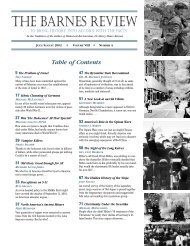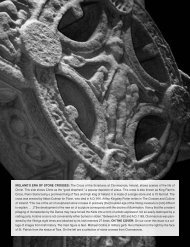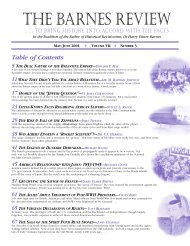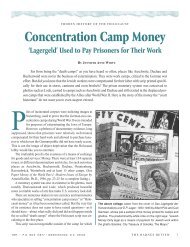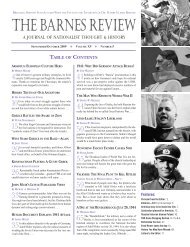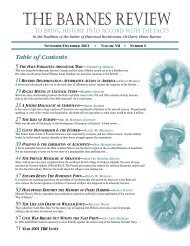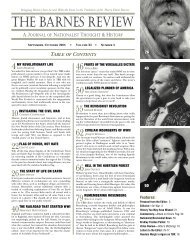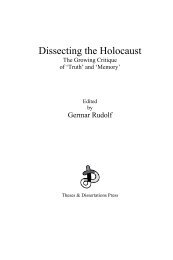Table of Contents - The Barnes Review
Table of Contents - The Barnes Review
Table of Contents - The Barnes Review
You also want an ePaper? Increase the reach of your titles
YUMPU automatically turns print PDFs into web optimized ePapers that Google loves.
cheaper to market goods over a standardized population rather<br />
than the differentiated villages that once was the face <strong>of</strong> Europe.<br />
Gradually, language, culture, and opinions became standardized<br />
over large segments <strong>of</strong> territory under the control <strong>of</strong> one ruler. It<br />
reached a point at the French Revolution, some time later, that the<br />
revolutionaries divided up France into many identical “administrative<br />
regions,” without regard to the various differences between the<br />
historical regions <strong>of</strong> the French nation. <strong>The</strong> French Revolution was<br />
the apogee <strong>of</strong> modern abstraction. Individuals, according to the<br />
state and the economy, were identical hunks <strong>of</strong> material that were<br />
to be properly manipulated by the occult “New Man” <strong>of</strong> the new ruling<br />
classes. It was not long before the totalitarian minds <strong>of</strong> Marx<br />
and August Compte was born, bringing to fruition this process <strong>of</strong><br />
the abstraction and dehumanization <strong>of</strong> mankind.<br />
In short, both from the point <strong>of</strong> view <strong>of</strong> the concentrated state<br />
as well as concentrated capital, the community <strong>of</strong> traditional<br />
Christian Europe was a hindrance. <strong>The</strong> state demanded loyalty to<br />
it and it alone, while capital needed an undifferentiated population<br />
to continue the expansion <strong>of</strong> markets at the lowest possible cost.<br />
This process has yet to cease; only its scope has changed. By the<br />
time <strong>of</strong> the French Revolution at the late 18th century, Edmund<br />
Burke, Joseph de Maistre, Johann Herder and a handful <strong>of</strong> others<br />
stood up against the entire project <strong>of</strong> modernity and its demand for<br />
centralization and standardization. <strong>The</strong> intellectual pedigree <strong>of</strong> this<br />
resistance became (in the philosophical sense) “conservatism” and<br />
later, “nationalism,” “communitarianism” and “devolutionism.”<br />
In spite <strong>of</strong> this, modernity continued its long march; man was<br />
bereft <strong>of</strong> a true identity. He was the subject <strong>of</strong> political and<br />
economic forces he could not hope to control. Decisions were<br />
made at distant capitals and centers <strong>of</strong> financial and industrial<br />
power. As man lost a sense <strong>of</strong> personal responsibility<br />
and became a pawn in the hands <strong>of</strong> massively powerful social<br />
forces, the <strong>of</strong>ficial political ideologies <strong>of</strong> the “New Men” reflected<br />
European man’s new condition: Darwinism, determinism, existentialism<br />
and Marxism became the new creeds for the New Man.<br />
Marx placed man at the behest <strong>of</strong> economic forces, Nietzsche<br />
saw man as inevitably manifesting the uncontrollable “will to<br />
power,” while Freud placed man at the behest <strong>of</strong> the two major<br />
instincts <strong>of</strong> the psyche—lust and death. Ideology was humanity<br />
exploring his new found shackles. <strong>The</strong> very concept <strong>of</strong> reason and<br />
science had been redefined in a way congenial to the new ideologies<br />
<strong>of</strong> European man. All <strong>of</strong> them reflected the new regime: the system<br />
<strong>of</strong> politics and economics that decidedly saw humanity as the raw<br />
material for the increased power and expansion <strong>of</strong> the New Men.<br />
Mankind eventually was sent to die by the millions in two world<br />
wars and countless “police actions.” He has been sent to the factory<br />
to be worked into an early grave for the New Class.<br />
Hence the present difficulties are reached. This all too brief<br />
and simplified historical sketch has landed at the end <strong>of</strong> the 20th<br />
century. <strong>The</strong> final conclusion is that man is a social being indeed,<br />
but he is not a part <strong>of</strong> a “mass.” Man’s place as a social being<br />
means that man is also a cultural being, a being capable <strong>of</strong> powerful<br />
impulses <strong>of</strong> affection, loyalty, and a deep civic kinship developed<br />
while acting within strictly defined social roles and moral<br />
norms. <strong>The</strong>se impulses towards the community are not irrational,<br />
but are based on man’s natural attachment to the social forms<br />
which provide him with a sense <strong>of</strong> identity and purpose. Man’s<br />
natural sociality means that this sense is in no way arbitrary—in<br />
that man’s identity in community is not arbitrary—but that social<br />
life is something that exists to solve definite needs and problems,<br />
44 N O V E M B E R / D E C E M B E R 2 0 0 3<br />
needs that belong to man as man. <strong>The</strong> cultural identity that comes<br />
to create the ethnos, peoples, and clans, is merely the means by<br />
which the natural law <strong>of</strong> human sociality manifests itself in the<br />
day to day moral decision-making <strong>of</strong> a cultural being. <strong>The</strong> communal<br />
sense <strong>of</strong> nationhood which at one time dominated<br />
European morals, and made another appearance at the end <strong>of</strong> the<br />
18th century and into the 19th (though, sadly, at the behest <strong>of</strong> the<br />
mass-state), still shows itself as the true, natural social milieu <strong>of</strong><br />
human beings.<br />
<strong>The</strong> local community is part <strong>of</strong> the national and ethnic<br />
unit that expresses man’s natural sociality in small,<br />
devolved forms that permit the family (the basis <strong>of</strong> all<br />
social life), identity and belonging to flourish.<br />
Authority is something that emanates from cultural<br />
forms, in that such forms contain the wisdom <strong>of</strong> the ages as the<br />
repository for generations <strong>of</strong> experience, victory, defeat, suffering<br />
and happiness. This instinct, in turn, is based on nature itself, for<br />
human beings solve problems in community: man is incapable <strong>of</strong> a<br />
solitary life; man is not physically or psychologically self-sufficient.<br />
<strong>The</strong> small community, manifesting its solution to various human<br />
needs which is the basis <strong>of</strong> culture and morals, is the proper and<br />
primary repository for human affection and loyalty. Here, mankind<br />
is not a “citizen,” a “consumer,” or any other abstraction <strong>of</strong> modern<br />
sociality, but a full and true human being with definite responsibilities<br />
and privileges, responsible to others as others are responsible<br />
to him.<br />
<strong>The</strong> ethno-nation (or even more accurately the ethno-commune)<br />
is not related to that abstraction <strong>of</strong> the “nation-state.” <strong>The</strong><br />
nation is something quite different and <strong>of</strong>ten opposed to the institutions<br />
<strong>of</strong> the state. <strong>The</strong> nation is a cultural community expressing<br />
man’s natural sociality and solidarity. <strong>The</strong> state is a formal organization<br />
<strong>of</strong> violence which intrinsically seeks to expand its power at<br />
the expense <strong>of</strong> the community and the loyalties it engenders. <strong>The</strong><br />
state <strong>of</strong>ten finds the tradition <strong>of</strong> nationhood a constant irritant to<br />
its demand for complete loyalty and ever expanding power,<br />
expressed in standardization and bureaucratization. <strong>The</strong> term<br />
“nation-state” is incoherent and irrelevant to contemporary politics.<br />
Nationalists speak <strong>of</strong> “nation,” “community,” and “region,”<br />
while liberals, neo-conservatives, Marxists, and capitalists speak in<br />
terms <strong>of</strong> “state.” In many ways, the modern follower <strong>of</strong> Johann<br />
Herder might be termed an ethno-communitarian anarchist,<br />
where governing power is not found in the distant bureaucratic<br />
state, but in the developing forms <strong>of</strong> cultural tradition, created and<br />
maintained by the constant interaction <strong>of</strong> autonomous institutions<br />
and estates, themselves the produce <strong>of</strong> centuries <strong>of</strong> accumulated<br />
historical experience. ❖<br />
ENDNOTES:<br />
1 Holland-America and many other now fashionable cruise lines were tormented<br />
by strikes between 10 and 15 years ago, some actually occurring in the<br />
midst <strong>of</strong> a cruise. <strong>The</strong> management easily solved the problem by making sure<br />
that each ship was so mixed with ethnicities speaking mutually-unintelligible<br />
languages that strikes have not occurred since.<br />
2 That excellent series <strong>of</strong> reports, Patterns <strong>of</strong> Corporate Philanthropy, put out<br />
by the Capitol Research Center, proves beyond a doubt the radically leftist<br />
nature <strong>of</strong> corporate giving from the records <strong>of</strong> the elite themselves.<br />
3 This author, in May <strong>of</strong> 2002, attempted to infiltrate the meeting <strong>of</strong> the<br />
super-elite “Bilderberg group” in northern Virginia. Now, he ultimately was<br />
unsuccessful, but it was made very clear that one <strong>of</strong> the major items on the agenda<br />
at this meeting was the discussion <strong>of</strong> the means and methods <strong>of</strong> eliminating<br />
nationalism as an ideological competitor.



